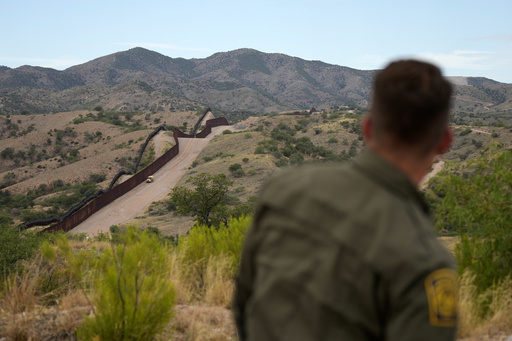
PHOENIX — Arizona residents are poised to cast their votes on a proposition that could enable local law enforcement to detain migrants suspected of illegally crossing into the state from Mexico. This proposed measure, known as Proposition 314, potentially conflicts with federal authority over immigration enforcement, yet its implementation may not be immediate or even come to fruition.
Should Proposition 314 gain voter approval, Arizona would follow other states in challenging the scope of local authorities in addressing illegal immigration. In the past year, Republican legislators in Texas, Iowa, and Oklahoma have enacted immigration laws, although federal courts have intervened to stop these states from enforcing such measures.
As the only pivotal swing state that shares a border with Mexico, Arizona has long been a focal point in the contentious debate over immigration policies. Since the early 2000s, local discontent regarding federal immigration enforcement has spurred initiatives to involve local police—who historically left border enforcement to federal agencies—in immigration control.
In 2005, the Arizona Legislature sanctioned an immigrant smuggling ban, which allowed former Maricopa County Sheriff Joe Arpaio to conduct immigration raids. Subsequent legislation included a 2007 law aimed at penalizing employers who knowingly hired undocumented individuals, and a significant 2010 law mandating that police question the legal status of individuals suspected of being in the country illegally during the enforcement of other laws.
Arizona voters have faced immigration-related decisions in the past. They endorsed a law in 2004 that restricted certain government benefits for undocumented immigrants and declared English the official language of the state in 2006. Conversely, a proposal in 2008 that proposed modifications to allow businesses to hire undocumented workers was rejected.
Advocates for Proposition 314 assert that it is essential for bolstering border security, attributing a surge in illegal immigration to the current administration’s policies. While illegal border crossings saw a record increase, recent governmental actions aimed at tightening asylum regulations have led to a significant decrease in such incidents in recent months.
On the other hand, critics of Proposition 314 warn that it could adversely affect Arizona’s economy and tarnish its image, as well as promote the racial profiling of Latino individuals. They recall the controversial practices during Arpaio’s leadership of the Maricopa County Sheriff’s Office, which resulted in a 2013 ruling where a federal judge found that Latino individuals faced racial profiling in police traffic stops intended to target immigrants. This legal ruling has since initiated extensive reforms within the agency, anticipated to impose costs of approximately $314 million on taxpayers by mid-2025.
Kelli Hykes, who is involved in health policy and supports Greg Whitten, the Democratic candidate for Arizona’s 8th Congressional District, expressed her deliberation regarding her vote on the immigration proposal but chose not to disclose her decision. “It’s so polarizing, and there are folks in my family that are going to be voting one way and I’m voting another,” Hykes shared.
Proposition 314 would designate illegal entry from Mexico outside authorized ports as a state offense, empowering local and state law enforcement to arrest offenders and allowing state judges to mandate deportations. Moreover, individuals enforcing this law would be protected from civil lawsuits.
Notably, the law would not be enforceable until a similar measure in Texas or other states has been operational for 60 consecutive days. Arizona lawmakers referred to Texas Senate Bill 4, which Governor Greg Abbott signed into law in December, permitting local authorities to arrest individuals accused of illegal entry into Texas. However, a federal appeals court placed a stay on this legislation in March. The following month, a panel of federal judges engaged in discussions regarding the law’s implications, and a decision from the panel is still pending.
Aside from the conditional provisions, other aspects of Proposition 314 would take effect immediately if passed. These include stipulations making it a felony to sell fentanyl that leads to a person’s death, punishable by up to a decade in prison, and prohibiting noncitizens from submitting fraudulent documentation when seeking employment or benefits from various levels of government.
